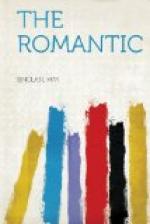If she had been cruel—if she had wanted to hurt Effie. She hadn’t meant to hurt her.
She thought of things. Places she had been happy in. She loved the high open country. Fancy sitting with Gibson in his stuffy office, day after day, for five years. Fancy going to Glasgow with him. Glasgow—
No. No.
She thought: “I can pretend it didn’t happen. Nothing’s happened. I’m myself. The same me I was before.”
Suddenly she stood still. On the top of the ridge the whole sky opened, throbbing with light, immense as the sky above a plain. Hills—thousands of hills. Thousands of smooth curves joining and parting, overlapping, rolling together.
What did you want? What did you want? How could you want anything but this for ever?
Across the green field she saw the farm. Tall, long-skirted elms standing up in a row before the sallow ricks and long grey barns. Under the loaded droop of green a grey sharp-pointed gable, topped by a stone ball. Four Scotch firs beside it, slender and strange.
She stood leaning over the white gate, looking and thinking.
Funny things, colts grazing. Short bodies that stopped at their shoulders; long, long necks hanging down like tails, pushing their heads along the ground. She could hear their nostrils breathing and the scrinch, scrinch of their teeth tearing the grass.
You could be happy living on a farm, looking after the animals.
You could learn farming. People paid.
Suddenly she knew what she would do. She would do that. It wasn’t reasonable to go on sitting in a stuffy office doing work you hated when you could pack up and go. She couldn’t have stuck to it for five years if it hadn’t been for Gibson—falling in love with him, the most unreasonable thing of all. She didn’t care if you had to pay to learn farming. You had to pay for everything you learned. There were the two hundred pounds poor dear Daddy left, doing nothing. She could pay.
She would go down to the farm now, this minute, and see if they would take her.
As she crossed the field she heard the farmyard gate open and shut.
The man came up towards her in the narrow path. He was looking at her as he came, tilting his head back to get her clear into his eyes under the shade of his slouched hat.
She called to him. “Is this your farm?” And he halted.
He smiled; the narrow smile of small, fine lips, with a queer, winged movement of the moustache, a flutter of dark down. She saw his eyes, hard and keen, dark blue, like the blade of a new knife.
“No. I wish it was my farm. Why?”
She could see now it wasn’t. He was out tramping. The corner of a knapsack bulged over his right shoulder. Rough greenish coat and stockings—dust-coloured riding breeches—
But there was something about him. Something tall and distant; slender and strange, like the fir-trees.




